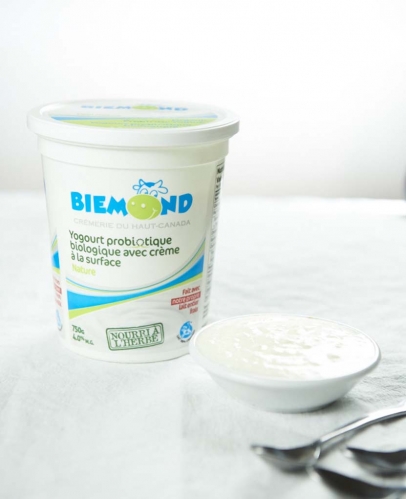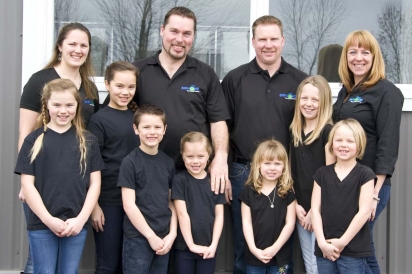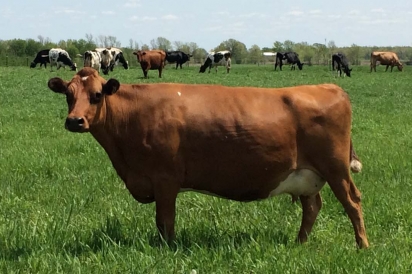Yogurt - From the Ground Up
There’s yogurt and then there’s yogurt with benefits. Pure, full-fat yogurt made with milk from nutritionally balanced, grass-fed cows raised on a certified organic farm is at the top of the yogurt pyramid. Added benefits accrue when that same yogurt also offers a boost of probiotic bacteria, which is good for the gut and good for your health, says Josh Biemond, one of the partners in the family farm business at Upper Canada Creamery. “We believe that fermented products are beneficial to our health because they contain bacterial cultures that work with our own natural gut flora.”
Biemond, with his wife Ellen, brother Rudi and his sister-in-law Jennifer, owns and works 400 acres of farmland an hour south of Ottawa, close to the U.S. border at Prescott. Their approach is at once modern and very traditional. They’ve embraced technology, but have returned to farming practices prevalent before the days of industrial agriculture. This means that they have a modern, automated milking machine imported from Australia on the one hand, while on the other, they use no pesticides and predominantly feed their cows a forage-based diet, the majority of which is grass with a top up of farm-grown oats through the leaner months, and kelp brought in from Nova Scotia.
Pieter Biemond Sr. and his wife Maria arrived from Holland and bought the land in 1981. They began to farm intensively. He brought equipment with him from Holland — the best spraying machinery around — and consequently, he spent months and months crop spraying his own land and that of others’ throughout the summer. After another long season on the sprayer, Pieter decided he’d had enough of expensive chemicals and gave it all up. In 1989, the farm gained organic certification. Since that time, the Biemonds have become soil and nutrition experts, with a long-term view to produce the best-tasting, healthiest milk and yogurt possible.
The 48 milking cows at Upper Canada Creamery, which produce approximately 1,000 litres of milk daily — some of which is sold to the Dairy Farmers of Ontario, the remainder kept for making yogurt — enjoy a nutritionally balanced diet, high in protein, plant-based sugars and fibre.
Josh, who is responsible for the land, believes strongly that soil chemistry and soil health is the first step to healthy cows and high-quality milk. “We use the tools that technology provides to make it simpler to be a smart farmer,” he says. “There’s no denying that new technologies allow you to become a better farmer.”
They spend much time and effort making sure that the soil is balanced, so that it produces plenty of high-quality grass, filled with omega 3s, 6s, fatty acids and the minerals, protein and sugars that the cows need. To this end, Josh aims to cut his hay at just the right moment, just before it flowers and seeds, when the digestible, balanced nutrients it offers are at their highest. This is then stored for the winter months, when the cows are out of the fields and in the barn.
Between May and November, the cows graze in the fresh pasture daily, moved along by a series of rolling electric fences, which allows each section to regenerate without being over-grazed. But when the pastures do need support, Josh chooses fish emulsion from the east coast, which is high in minerals and soft rock phosphate from B.C. to boost calcium levels. The herd is a mixed bag of breeds, that includes Swedish Red, Jersey, New Zealand and Dutch Amerii, “because each breed specializes in different component in the milk,” explains Ellen. “Also, we look at physical attributes. Can these cows walk a long way? They are encouraged to walk and forage as they used to do, before the days of factory farming and high-intensity milk production.”
Of course, the Biemond’s look for robust cows with all-around good health, but it’s not a primary concern. “Our veterinary bill is minimal because we’re proactive on the health issue and our cows have the tools to fix themselves,” explains Josh.
Milking takes place daily at 5 a.m. and 5 p.m. in the new milking shed, complete with a high-tech milking machine, the only one of its kind in Canada, built and installed by Josh and Rudi. “There were plenty of calls to Australia while we were building it,” jokes Josh. The milking machine accommodates 24 cows at a time, on a slowly rotating concrete pad. Each cow walks on, get her teats cleaned, milks and strolls off the far side. The whole operation takes about eight minutes per cow.
The farm also boasts solar panels, that provide power back to the grid, and a sparkling stainless steel visitor’s centre with large glass viewing windows over the yogurt-manufacturing facility. “The whole idea is to come here once, see where your food is made, then buy it at the store, closing the loop with the farmer,” Josh says.
The milk arrives from the dairy a hop and a skip away and is pasteurized. It is not, however homogenized (the process of breaking down the fat molecules in the milk, meaning that the cream does not rise to the top). “We believe that simple is best. By minimizing the amount of processing happening, we believe that our yogurt maintains its nutritional quality,” Jennifer says.
Next, the milk is heated and cooled to just the right temperature to be mixed with the freeze-dried bacteria that is imported from Italy. “We searched high and low for a good culture,” says Josh, “and we chose a sweet one that uses the lactose in the milk to slightly sweeten the yogurt. In this way, this is a totally natural product. One that is top-quality — there are no additives.”
The yogurt is packaged and left to ferment in a heat room, where it settles into a semi-solid state with a thin layer of darker yellow cream on top of the snow-white yogurt. The result of this process is a four-per cent-fat, creamy, high-pH yogurt.
“It’s an education process to explain to people that this is the cream on top. We wanted to have it there, to start that conversation,” Josh says. “Consumers are not used to it. But we want to provide a premium product that is top quality and good for you.” Finally, the yogurt is moved to a cooler to be refrigerated before shipping.
Biemond’s yogurt is available in hundreds of stores between Ottawa and Toronto, including Herb and Spice on Wellington Street, the Natural Food Pantry, Market Organics, Thyme & Again Creative Catering and Take Home Food Shop, Cedars & Co. Food Market and Whole Foods in Ottawa.
It’s also used to make frozen yogurt treats such as rhubarb swirl, peanut butter, caramel crunch, raspberry, vanilla bean and chocolate flavours, which are sold at the farm visitor’s centre. “We use organic, locally sourced fresh fruit where possible,” Ellen says, the frozen yogurt queen, “and the idea is to have a maximum of five ingredients — organic raw sugar, farm fresh eggs, yogurt and fruit.”
However, when asked for their favourite way to enjoy their yogurt, Josh, Jennifer and Ellen agree that it’s good in smoothies, but best in its simplest form — with a spoon and a generous drizzle of maple syrup. How Canadian is that?
Upper Canada Creamery
11575 Waddell Rd., Iroquois, Ont.
uppercanadacreamery.com, 613.803.8890







